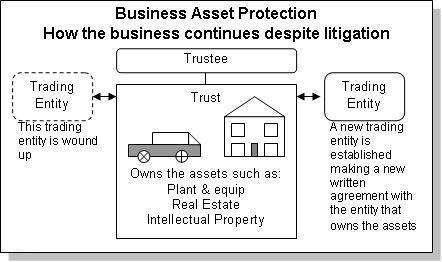
What is a Business Trust?
A business trust is similar to a traditional trust in that its trustees are given legal title to the trust property to administer it for the advantage of its beneficiaries who hold equitable title to it. A written declaration of trust specifying the terms of the trust, its duration, the powers and duties of the trustees, and the interests of the beneficiaries is essential for the creation of a business trust. The beneficiaries receive certificates of beneficial interest as evidence of their interest in the trust, which is freely transferable.
In some states, a business trust is subject to the laws of trusts while, in others, the laws of corporations or partnerships govern its existence. The laws of each state in which a business trust is involved in transactions must be consulted to ensure that the trust is treated as an entity whose members have limited liability. If the laws of a particular state consider a business trust to be a partnership, the beneficiaries may be fully liable for any judgments rendered against it. The trustees of a business trust are liable to third parties who deal with the trust unless there is a contract provision to the contrary, since they hold legal title to the trust property and may sue and be sued in actions involving the trust. They may, however, seek indemnity from the trust property and possibly from the beneficiaries.
The property of a business trust is managed and controlled by trustees who have a fiduciary duty to the beneficiaries to act in their best interests. In many states, the participation of the beneficiaries in the management of the property destroys their limited liability, and the arrangement will usually be treated as a partnership.
Profits and losses resulting from the use and investment of the trust property are shared proportionally by the beneficiaries according to their interests in the trusts.
A business trust is considered a corporation for purposes of federal Income Tax and similarly under various state income tax laws.
Why You Might Want a Business Trust
It’s a sad fact that certain industries and professionals are more susceptible to litigation than others. While our firm certainly recommends asset protection for every business owner, we don’t recommend the following asset protection for every business. Professionals such as doctors and soloists with considerable plant and equipment or, perhaps more likely, intellectual property are examples of businesses that should consider some form of asset protection.
As a note, before considering any asset protection one should have adequate insurance as a stop-gap.
With a business which has a tremendous amount of value in machinery, equipment or intellectual property, these items should be held separate from the trading entity.
A useful analogy is that the business is like a tree, with the main trunk being the most important part. Tree branches may fall off from time to time but the tree trunk continues to grow. All efforts and energy go into keeping the tree growing and not allowing anything to harm it. So it is with a business or investing – keep it growing and protected. Below is an example.

